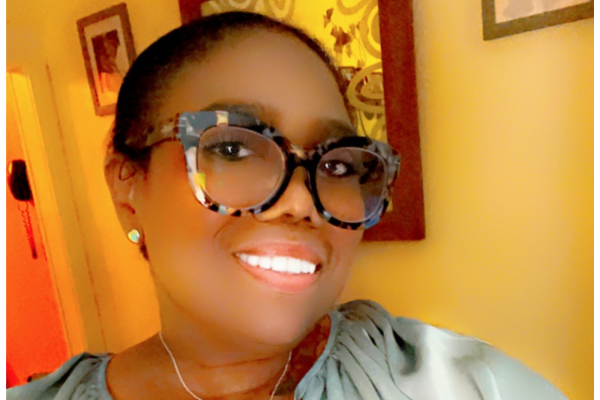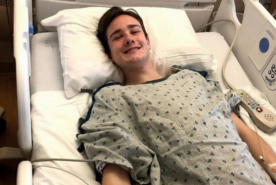February 13, 2024
In 1995, Lisa Myers noticed a mysterious swelling in her feet and ankles. Little did she know that this symptom would mark the beginning of a challenging journey–one that led to a kidney disease diagnosis, ten years on dialysis, and two failed kidney transplants.
Despite these difficulties, Lisa kept fighting and now encourages others to do the same.
This is her story as a three-time kidney transplant recipient.
An Unexpected Diagnosis
Because Lisa was only in her thirties, she didn't think much of the swelling at first.
"I put my feet up that night to see if it helped. It didn't and my urine looked like soapy water the next morning," Lisa said. "I went to the doctor. A urine test discovered protein, a sign of kidney issues, and my doctor referred me to a nephrologist."
Lisa's nephrologist ordered a biopsy and uncovered the problem–nephrotic syndrome.
"Nephrotic syndrome occurs when the filtering units in the kidney are damaged. The swelling and bubbly urine were symptoms of my kidney function declining," said Lisa. "I felt there were only two ways forward–go down or continue to live. I chose to continue living. I became a registered nurse and managed my kidney health for ten years through diet, exercise, and medications."
In 2005, Lisa went for a healthcare visit to prepare for a trip to Bermuda. She got unwelcome but not surprising news.
"I had a feeling my kidneys were failing. When my nephrologist said we had something important to discuss when I returned from my trip, I knew.” Lisa said, "After my vacation, I began peritoneal dialysis and got on the kidney transplant waiting list."
The expected wait time for a kidney is three to five years, but can be closer to ten years in some areas of the country. Lisa received the call just four months later. A five-year-old deceased donor kidney was available. Because of the age difference, it wasn't a perfect match, but Lisa jumped at the chance.
For three years, Lisa enjoyed life with her new kidney. Then, she began experiencing symptoms of depression out of nowhere.
"My nephrologist prescribed me an antidepressant and had my labs drawn. Before I could fill the prescription, he called and told me to come back," said Lisa. "My kidney was failing, and I needed to start dialysis again."
Kidney failure and depression have similar signs:
- Exhaustion
- Trouble sleeping
- Poor appetite.
Both should be taken seriously. If you experience these symptoms, seek professional help.
Subscribe today!
Join the NKF Blog Newsletter
Get inspirational stories and kidney disease resources delivered to your inbox every month. You'll gain practical insights and expert advice to help you better understand and manage your kidney health, no matter where you are on your kidney journey.
A Community Comes Together
Lisa was disappointed that her kidneys failed, but it highlighted just how much people cared for her.
“A large group of my coworkers got tested to become my living kidney donor. It felt amazing to have that many people willing to step up for me." Lisa said, "I matched with three but one of my colleagues, Lisa Malesky, was a universal donor–a perfect match."
The surgery would have to wait, though. Lisa developed epidermolysis bullosa acquisita (EBA), an autoimmune disease that causes skin blistering.
"Suddenly, I had blisters covering my entire body, including my mouth. EBA is very rare and usually happens to older people. It can also happen if your kidneys are crashing or your immune system is struggling." Lisa said, "Prednisone fixed the issue, but not before it caused a gastrointestinal bleed and scarring all over my body."
Once the blisters disappeared, the surgery was scheduled for March 18th, 2009.
"When I woke up from the surgery, I noticed I didn't have any urine in the bag. That meant the kidney wasn't working yet. Time passed, and my friend couldn’t keep me awake so she called the nurse and nephrologist in. I had bleeding in my stomach, so they took me back to surgery," said Lisa.
Lisa spent the next month in the hospital trying to save her kidney.
"I tried every treatment available. Towards the end of my stay, my nephrologist said, 'Lisa, stop letting them do this to you. The kidney is gone.' Deep down, I already knew that.” Lisa said, “As a nurse, I understood that the amount of urine I was putting out wasn't enough. I made the painful decision to remove the kidney."
While returning to dialysis was difficult, Lisa felt physically better and was excited to work again.
"On my first day of work, I was looking for Lisa Malesky. Another colleague let me know she was on leave due to a recent accident that took her son’s life. He, a member of the Coast Guard, was trying to save a boat when his plane was accidentally struck by another assisting in the rescue." Lisa said, "It was horrible, but it made us grow even closer. She'd done so much for me, and I wanted to give back in some way. I called every doctor and nurse I knew and raised $5,000 for a scholarship fund in her son's name. Our hospital continues this scholarship to this day."
Are you looking for a living kidney donor or interested in becoming one yourself? Visit the Kidney Learning Center to learn more.
A Third Chance
While Lisa waited for a kidney, she continued her medical studies. She was finishing a Master's Degree in 2018 when a friend recommended getting listed at a second transplant center.
"I decided to go for it. The moment I stepped into the new center, I knew everything was going to work out. They were very informative and caring," said Lisa. "They reviewed my charts and determined my last kidney failed from blood loss and not rejection. This mattered. My body hadn't rejected two kidneys. It gave me hope that my next transplant would work."
This center was ready to list Lisa, but she had one stipulation–to graduate first.
"Soon after I graduated, I got the call. I was second in line for a kidney. At one-thirty in the morning, they called again. The kidney was mine, but I was nervous. I'd had two transplant failures at this point and had settled into my dialysis routine," said Lisa. "When we got to the hospital, my team was so positive I felt reassured that I was in good hands."
When Lisa woke up from the surgery, she saw a bag full of urine–the kidney was working! With that knowledge, she peacefully went back to sleep.
"When they took the catheter out, I urinated for the first time in a decade. That's when it hit me–After ten years of dialysis, working full time, and going to school, I was going to be free again. I guess you could say, 'third time's the charm' for me." Lisa said, "After recovery, my transplant center honored me with an invitation to speak to their staff as a qualified speaker with experience as a patient and a provider."
It's been four years, and Lisa's kidney is still functioning. She's a school nurse, volunteers during her free time, and has begun focusing on her mental health.
"My coworkers couldn't understand how I could go to dialysis and come to work every day. Helping people got me through it. Now, I need a professional to fully heal. I started therapy and am working through the trauma by writing a book about my story," said Lisa. "I want others on dialysis to know that they aren't alone. There is hope. Don't give up."
Do you need support on your kidney journey? Join NKF Peers. We'll match you with a trained mentor who has been there themselves.


















